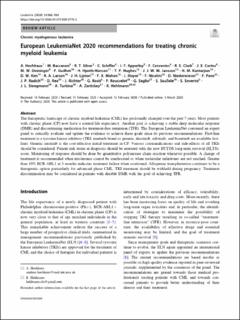European LeukemiaNet 2020 recommendations for treating chronic myeloid leukemia
Hochhaus, Andreas; Baccarani, Michele; Silver, Richard T.; Schiffer, Charles A.; Apperley, Jane F.; Cervantes, Francisco; Clark, Richard E.; Cortes, Jorge Eduardo; Deininger, Michael Werner Nikolaus; Guilhot, François; Hjorth-Hansen, Henrik; Hughes, Timothy Peter; Janssen, Jeroen J.W.M.; Kantarjian, Hagop M.; Kim, Dong-Wook; Larson, Richard A.; Lipton, Jeffrey Howard; Mahon, François-Xavier; Mayer, Jiří; Nicolini, Franck Emmanuel; Niederwieser, Dietger Walter; Pane, Fabrizio; Radich, Jerald P.; Réa, Delphine; Richter, Johan; Rosti, Gianantonio; Rousselot, Philippe; Saglio, Giuseppe; Saußele, Susanne; Soverini, Simona; Steegmann, Juan Luis; Turkina, Anna; Zaritskey, Andrey Yu.; Hehlmann, Rüediger
Peer reviewed, Journal article
Published version
Permanent lenke
https://hdl.handle.net/11250/2722001Utgivelsesdato
2020Metadata
Vis full innførselSamlinger
Sammendrag
The therapeutic landscape of chronic myeloid leukemia (CML) has profoundly changed over the past 7 years. Most patients with chronic phase (CP) now have a normal life expectancy. Another goal is achieving a stable deep molecular response (DMR) and discontinuing medication for treatment-free remission (TFR). The European LeukemiaNet convened an expert panel to critically evaluate and update the evidence to achieve these goals since its previous recommendations. First-line treatment is a tyrosine kinase inhibitor (TKI; imatinib brand or generic, dasatinib, nilotinib, and bosutinib are available first-line). Generic imatinib is the cost-effective initial treatment in CP. Various contraindications and side-effects of all TKIs should be considered. Patient risk status at diagnosis should be assessed with the new EUTOS long-term survival (ELTS)-score. Monitoring of response should be done by quantitative polymerase chain reaction whenever possible. A change of treatment is recommended when intolerance cannot be ameliorated or when molecular milestones are not reached. Greater than 10% BCR-ABL1 at 3 months indicates treatment failure when confirmed. Allogeneic transplantation continues to be a therapeutic option particularly for advanced phase CML. TKI treatment should be withheld during pregnancy. Treatment discontinuation may be considered in patients with durable DMR with the goal of achieving TFR.

